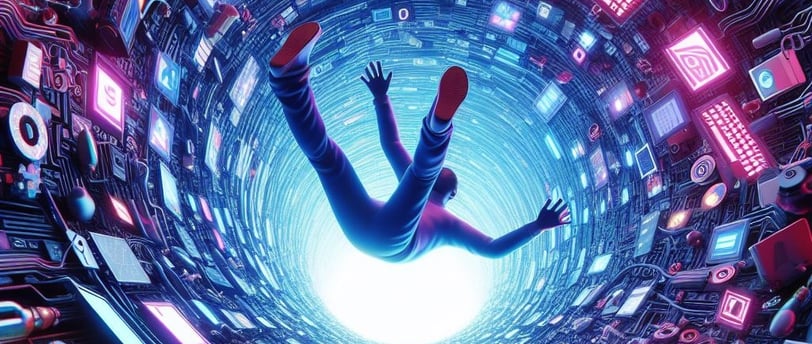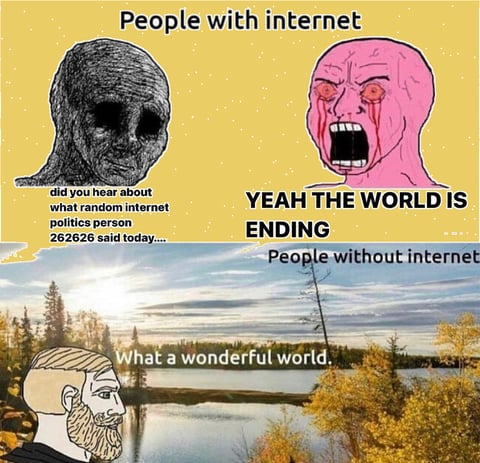Disconnected: How the internet destroys your mind
Digitization and the rise of the internet is the dominating factor in societal change of the past 30 years. It has fundamentally changed our lives. There are many obvious practical benefits to the internet. But the downsides are sinister, because we are hardly aware of them. What's the real price you pay for the internet?
Kain and Leonhard
3/17/20246 min read


The first steps to quitting your internet addiction
Humans did not evolve to be able to process the amount of information that you get swamped with on a daily basis. The average person spends 7 hours of their daily time on a screen connected to the internet, mostly absorbing information. Entertainment. News. Messages. This massive amount of time is ALL TIME YOU CAN USE TO MAKE YOUR LIFE MORE FULFILLED
On top all, the constant flow of information these things accumulates in your mind and needs to be processed. The main processing tool we have is sleep and other states of rest or low focus. Our subconscious orders the things that happened and puts them into perspective. But if it is overwhelmed with processing information that you absorbed from shows, news and such, you won't be able to process your own life story. Your mind will remain foggy around your actual own everyday experiences and who you are because it's full of information and other peoples (fictional) stories.
Sleep is a crucial tool for humans to process their thoughts and emotions. This is inhibited by flooding yourself with media. Our dreams will be occupied with the contents of the media we consume during the day when we for example when we binge-watch some series for half a day. When we don’t watch anything for a while, our dreams go back of being creative alterations of things that happened in our own life. The subconscious can’t fully understand the difference between experiencing an emotion or situation in real life or experiencing an emotion and seeing something happen on a screen. It becomes part of your life.
In consequence, you become off-centered. You can’t process the thoughts and emotions that you encounter in your daily life. You start to disengage from them. You slowly stop feeling yourself.
But the problem isn’t only in processing at night. It’s also during the day.
Procrastination and avoiding emotions
Consuming internet media is oftentimes about avoiding what’s really happening. That's not only a problem when you avoid important work you should be doing. It is an even bigger problem when you distract yourself whenever an uncomfortable feeling arises.
You think this is absurd? Try watching your own behavior for a while. When do you check your phone? Do you only do it when you expect an urgent message? No. You do it dozens of times a day simply when your mind is unoccupied for a second and especially when you are having uncomfortable feelings. It’s the perfect distraction. The hope of an exciting message coming in. The quick dopamine kick of a meme. Someone liked your Instagram image. (How often do you check your phone per day? Install an app like StayFree and track it for a week. You will be absolutely shocked.)
Instead of focusing on your emotion and figuring out what it wants to tell you or in what direction it wants to push your behavior, you ignore it. Instead of taking idle times to feel what's going on within, you engage your neo-cortex with even more information.
Yes, of course, there were TV-shows and news before the internet. They had the same issue. But the problem has massively intensified since the invention of the internet. Some sociologists nowadays think of your phone as a part of your body. Information is always available everywhere. It is unlimited and accessible at the push of a button. We are information addicts in a sea of cocaine. You can experience more different information in a day than a person 500 years ago could experience in a month, a year - hell, maybe even a lifetime.
The internet doesn’t connect us more closely
You can call or text all your contacts anytime. You can reach people all over the globe. We are more connected than ever!
Or are we?
The question is, what is human connection? What do we value? What fulfills us? The short answer is: It’s not digital connection with thousands of people. It’s real-life connection with a handful of people that are important to us. Seeing each other, touching each other, spending time next to each other. Artificial human connection doesn’t satisfy us. We know it’s fake, but we run from that truth. Chatting online is not a real conversation. Watching internet porn is not having sex.
Digital communication creates a connection, but one that is by magnitudes less meaningful and fulfilling than real one. Some studies suggest that the content of a message only makes up a laughable 7% of what we express when we walk. The other 93% are made up of voice, tone and body language. Just think about it situations in your own life: How much is lost between the lines when you can’t see if someone is upset or uncomfortable in their face? When you can't see if their body language is closing down or opening up? When you can't hear their voice change in real time? When you text instead of meeting a person in real life, all you will probably get is a “I’m doing OK :)”. You will know barely anything about how the other person feels and thinks. Is this seriously how you want to connect with people?
There are really fucking scary trends happening. The amount of close friends that people have has dropped dramatically in the past few decades. The amount of people living alone has increased dramatically. We believe that all these tendencies are part of one of the biggest crises of our times, the crisis of disconnection. The internet is worsening all these tendencies by letting us spend more time in front of screens, and less with people.


A new digital world
The magnitude of the Internet’s pull on us is becoming frightening. Small children are given tablets and phones by their parents to distract them. It's the modern version of liquor or poppy-seed-laced pacifiers. Digital natives, the generation born and raised with the internet have massively higher usage times than the older generations. They barely get offline anymore.
People of that generation look at you like an aliens when they exchange contacts and you insist on a phone number instead of Instagram. Digital communication is becoming more common than real conversations. We see each other as images, as constructed personalities, not as real people. People are more inclined and trustful to meet someone for a date that they have met on a dating app than someone who approached them in a cafe on their way to work. Both are strangers. But from the online person they have images on their phone that they can cling on to and feel somewhat secure. Even if they have not ever seen them in real life. Two decades back, meeting a stranger from a website was considered reckless and dangerous, nowadays it is the opposite. Digital communication has become the norm.
That is absolutely insane.
Some very young readers might not intuitively understand why this is so crazy. We are in so deep into the digital jungle, we can't even see straight and notice what we are missing.
And even if you weren’t born with the internet, you got insanely used to it. When is the last time you have turned off ALL digital devices (phone, laptop, TV, tablet) for 24 hours? For a week? Do you even have that degree of self-control?
Enough lamenting, let’s get to ACTION
The truth is, the internet isn’t gonna go away. But you can seek out real connection. Both a connection to yourself and to other people.
You can seek for a fulfilling life. You are not a slave to technology. It might be hard. It’s addictive. But you can. You will find a way.
Here are some pragmatic steps:
Pay attention to you own behavior. Become aware when you check your phone. Then don’t check it and instead feel what you feel right in that moment. It is important. Close your eyes for 2 minutes, then continue on with your day. Do this every time you get the impulse to randomly check your phone.
Disconnect fully for one day a week. Maybe Sundays. Turn off all your devices. Take walks in nature. Cook. Meet a friend.
Generally spend less time on devices. Track your time using them.
Don’t watch a show while you eat. Just eat. One thing at a time. Don’t submit to the information overflow.
Practice things that help you focus your awareness to the present and to your emotions. Spend more time in nature, touch grass. Consider taking shrooms. Meditate.
About us:
We, Kain and Leo, are living a quitters life. We have chosen to go our own way and want to help you find yours. If you want help on your journey, contact us start@quitters.life and put “I’M IN, I WANT TO COMMIT” at the top of your message.
And honestly, we are not interested in you singing up/writing us personally if you are not committed to creating a different life.
one hundred quitters
newsletter
We commit to supporting you as best as we possibly can. This is why our newsletter community is limited to 100 people only. Expect personal growth beyond what any other newsletter could possibly deliver.
